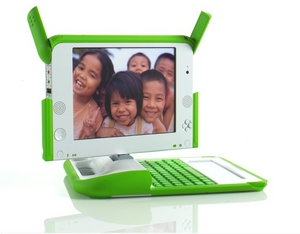Le Wiki de OLPC: Difference between revisions
(First part of the french translation) |
|||
| Line 32: | Line 32: | ||
Mais pourquoi les enfants des pays en voie de développement auraient-ils besoin d'ordinateurs portables? Parce-que l'ordinateur portable est à la fois une fenêtre et un outil: une fenêtre sur le monde et un outil avec lequel penser. C'est, pour un enfant, un merveilleux moyen d'apprendre à apprendre, grace à l'interaction et à l'exploration. |
Mais pourquoi les enfants des pays en voie de développement auraient-ils besoin d'ordinateurs portables? Parce-que l'ordinateur portable est à la fois une fenêtre et un outil: une fenêtre sur le monde et un outil avec lequel penser. C'est, pour un enfant, un merveilleux moyen d'apprendre à apprendre, grace à l'interaction et à l'exploration. |
||
'''Plus d'informations sur cet [[The Children's Machine|ordinateur portable]]''' |
'''Plus d'informations sur cet [[The Children's Machine|ordinateur portable]]''' et sur '''[[Learning Vision|la vision de l'apprentissage de OLPC]]'''. |
||
==Contenu du wiki== |
==Contenu du wiki== |
||
Revision as of 17:11, 9 March 2007
News
- The B2 machines have arrived in Cambridge and are being distributed to developers who have joined the Developers Program. Those without machines can still run emulators on their current computers. If you have a machine, please see the BTest-2 Release Notes and B1 Demo Notes.
- The specification for our security platform, Bitfrost, has been released. Comments invited!
- The One Laptop per Child (OLPC) website has a new look, thanks to the efforts of Nurun and Pentagram. See also the OLPC Foundation website. We'll be setting up the infrastructure for translation of the new site in this wiki soon.
- Rwanda commits to the "One Laptop per Child" initiative.
- Uruguay announced its participation in the OLPC project.
- B1 Release Notes can be found here and should be read carefully by anyone with a BTest system.
- OLPC wins Popular Science's Best of What's New 2006.
- IDB and OLPC formalize an agreement aimed at support mainstreaming of new approaches to digital technology in Latin American and Caribbean education.
Weekly updates can be found in Current events.
Le projet One Laptop per Child (Un Ordinateur Portable Par Enfant)
- It's an education project, not a laptop project.
- C'est un projet d'éducation, pas un projet informatique.
- It's an education project, not a laptop project.
Ceci est le wiki de l'association One Laptop per Child (Un Ordinateur Portable Par Enfant). La mission de cette association a but non lucratif est de développer un ordinateur portable peu cher —"le portable à 100$"— une technologie qui pourrait révolutionner l'éducation des enfants du monde entier. Notre but est de donner à tous les enfants du monde de nouvelles opportunités d'explorer, d'expérimenter, et de s'exprimer.
Mais pourquoi les enfants des pays en voie de développement auraient-ils besoin d'ordinateurs portables? Parce-que l'ordinateur portable est à la fois une fenêtre et un outil: une fenêtre sur le monde et un outil avec lequel penser. C'est, pour un enfant, un merveilleux moyen d'apprendre à apprendre, grace à l'interaction et à l'exploration.
Plus d'informations sur cet ordinateur portable et sur la vision de l'apprentissage de OLPC.
Contenu du wiki
Un bon endroit pour démarrer l'exploration de ce wiki est la page One Laptop per Child, qui donne une vue d'ensemble du projet. Elle contient une foire aux questions (FAQ); un endroit où poser une question; et de nombreuses pages concernant la partie matérielle, le partie logicielle, les éducateurs, et le programme de développeurs—et un wiki séparé pour le développement de logiciels. Sugar is a novel interface with its own interface guidelines. There are also discussion pages on issues of deployment and country-specific discussions. An extended table of contents is also available. The latest build is always available here. The latest stable build is always available here.
A propos du wiki
The purpose of this wiki is to both share information about the project and to solicit ideas and feedback. The articles and discussion vary from technical to epistemological. We invite comments on every page (please use the "discussion" tab at the top of each page). Please restrict edits to the article pages themselves to facts, not opinions. You are encouraged to sign your work and to make liberal use of citations and links. (Please make an account and please use ~~~~ as a signature for your comments.) Please note that pages that include the {{OLPC}} template—such as this one—are maintained by the OLPC team and are generally representative of the current state of the project. Other pages—created and maintained by the public—should be read with that in mind.
